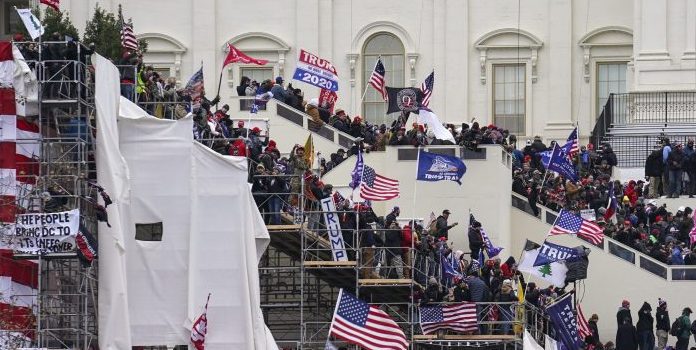(Headline USA) The Biden administration this week broke ages of longstanding presidential tradition on executive privilege in the interest of waging a partisan strike to undermine former President Donald Trump.
It comes amid plummeting poll numbers for Democrats and a growing likelihood that Trump may run again in 2024.
Even before then, the Left sees few weapons to help stem the red wave that may ensue in the 2022 midterm election.
Thus, with few policy successes to point to, it has continued to capitalize on Democrat constituents’ personal animus toward the former president and their obsession with the Jan. 6 uprising at the US Capitol.
The Biden White House agreed to a request from leftists in Congress that specifically targets sensitive information on the actions of Trump and his aides during the Jan. 6 protest.
Trump isn’t letting the move go uncontested.
Referring to the Presidential Records Act, Trump wrote to National Archives formally asserting privilege over nearly 50 documents.
“I hereby make a protective assertion of constitutionally based privilege with respect to all additional records,” Trump wrote, adding that if the committee seeks other information he considers privileged information, “I will take all necessary and appropriate steps to defend the Office of the Presidency.”
With Trump’s challenge to the requests on the table, a lengthy legal battle is likely to ensue over the information.
Courts have ruled that former presidents are generally afforded executive privilege in some cases.
Biden’s decision not to block the information request sought by Congress runs counter to a tested norm—one in which presidents enjoy the secrecy of records of their own terms in office, both mundane and highly sensitive, for a period of at least five years, and often far longer.
That means Biden and future presidents, as well as Trump.
While not spelled out in the Constitution, executive privilege has developed to protect a president’s ability to obtain candid counsel from his advisers without fear of immediate public disclosure and to protect his confidential communications relating to official responsibilities.
But that privilege has its limitations in extraordinary situations, as exemplified during the Watergate scandal, when the Supreme Court ruled that it could not be used to shield the release of secret Oval Office tapes sought in a criminal inquiry, and following the Sept. 11 terrorist attacks.
Meanwhile, Democrat presidents have asserted it liberally and benefited from its protections to cover up matters such as Bill Clinton’s marital infidelity.
Biden, himself, was able to avert serious scrutiny for a serious and credible rape allegation under similar circumstances as the University of Delaware, which holds the papers from his years as a US senator, refused to release them until five years after he had left public service.
However, the four-hour-long Jan. 6 protest at the US Capitol during the tenure of a Republican leader belongs among the ranks of “extraordinary” circumstances, Biden’s White House counsel claimed in a letter to the keeper of records, the Archivist of the United States.
White House press secretary Jen Psaki said the congressional panel seeking the records is investigating “a dark day in our democracy” and that context, in her opinion, should be considered.
If history is any guide, once the door to reviewing past presidential records is ajar, future Congresses and presidents could swing it open further as politics warrant.
Presidents tend to be protective of their ability to keep White House documents private, both for themselves and their predecessors.
But any White House move to deny the congressional request for records on Trump’s activities could antagonize Democratic legislators just when Biden needs their support to advance his agenda.
The documents requested by the congressional committee are part of an investigation into how the Jan. 6 so-called mob was able to infiltrate the Capitol and disrupt the disputed certification of Biden’s presidential victory.
More than 630 people have been charged criminally in the attack, the largest prosecution in U.S. history.
Thousands of documents have been sought from the Trump administration as they try to determine how the so-called insurrection could have happened. Many of those requests went to the National Archives, where Trump’s correspondence during his time in office is held.
According to an executive order on presidential records, the archivist of the United States “shall abide by any instructions given him by the incumbent President or his designee unless otherwise directed by a final court order.”
Adapted from reporting by the Associated Press.

